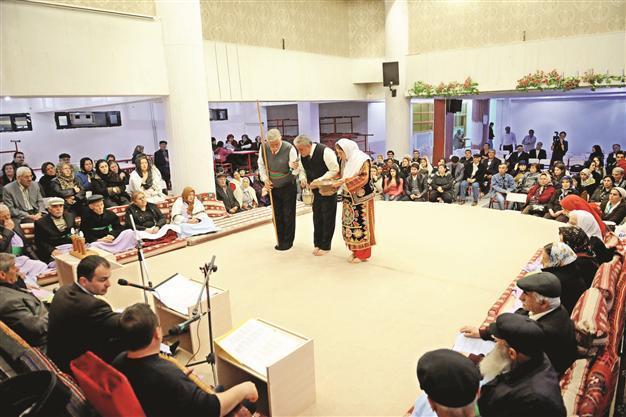Parliament’s cemevi denial slammed by Alevi groups
ISTANBUL - Hürriyet Daily News

Alevism has practices distinct from those of Turkey’s Sunni majority. The Alevi house of worship is called a cemevi, while Sunnis worship in a mosque. DAILY NEWS photo/Selahattin SÖNMEZ
Alevi organizations immediately lashed out at the Turkish Parliament’s official statement rejecting house of worship status for cemevis and calling on Alevis to go to mosques.
It is not possible to consider cemevis places of worship, because Alevism, as part of Islam, cannot have a place of worship other than mosques and mescids, the Turkish Parliament has said in a statement.
“Alevism, which is a subgroup of Islam, cannot have a place of worship other than mosques or mescids, which are common places of worship within Islam,” Parliament’s statement read.
The statement showed the Turkish government’s insistence on denying Alevis’ rights and the willingness to continue pursuing assimilation policies, Alevi Bektaşi Federation Chairman Selahattin Özel said yesterday.
“The mosque is not the place of worship of Islam as the statement said; it is not the cemevi either. They are derivative; at the time that Islam was born there were no mosques. They [the government officials] are abusing religion,” Özel said in a phone interview with the Hürriyet Daily News.
Istanbul-based Hubyar Sultan Alevi Association also defined the statement as “assimilation obstinacy.”
Parliament’s statement came up as a defense directed at the Ankara 6th Administrative Court demanding the dismissal of a case which was filed by Republican People’s Party (CHP) Tunceli deputy Hüseyin Aygün.
Aygün had filed a formal application in May requesting a place be provided for a cemevi within Parliament facilities, but Parliamentary Speaker Cemil Çiçek rejected the idea.
A theologian from Ankara University backed Alevis’ right to worship saying this issue must be considered within the freedom of religion.
Alevis exist in Turkey and if they perform Islam differently from Sunnis then they must be given space to do so and if Parliament tells them to go mosques then they must respect their rituals, said Beyza Bilgin of Ankara University Divinity School.
“Even if there is one Alevi in Parliament, a cemevi must be in service for him,” Bilgin said.
Bilgin said the issue should be looked at from another perspective to find a proper solution, if Alevis are invited to mosques then they must be given the right to conduct their rituals like singing and playing saz (an Anatolian musical instrument). She added that she did not think that point had been reached.
In addition to the Sunni Muslim majority, academics estimate that there are between 15 million and 20 million Alevis in Turkey.
Strong case gets complex
Malatya – Doğan News Agency
The testimonies of some 50 suspects have been erased from a court boards’ computer database in a case against the alleged assailants of an attack against an Alevi family.
The house of an Alevi family was stoned and their stables burned down by dozens of people in the
eastern province of Malatya during Ramadan in June. A family member allegedly told the local Ramadan drummer not to wake his family for sahur, the religious meal eaten before sunrise during Ramadan, and a mob attacked the family causing an outcry in Turkey.
The chief judge has postponed the case to Feb. 21, 2013 in order to investigate the source behind the erasure of 52 suspects’ testimonies.
